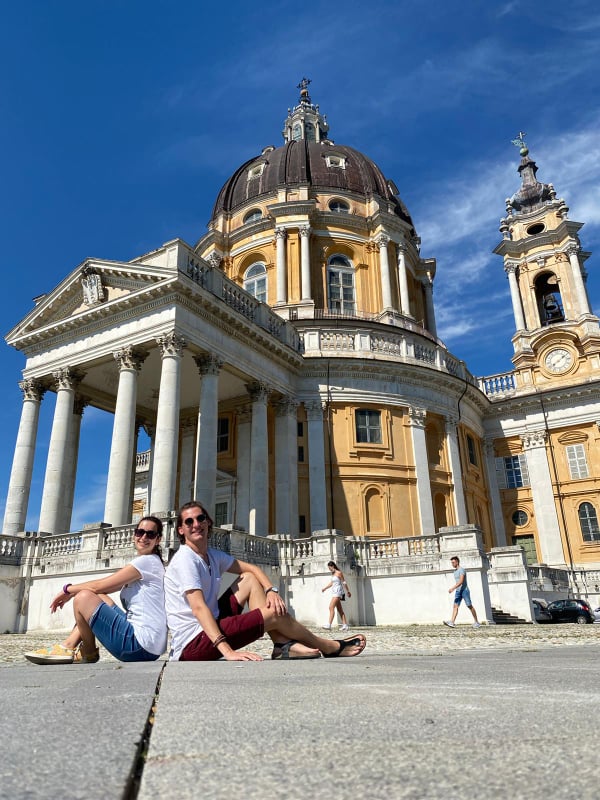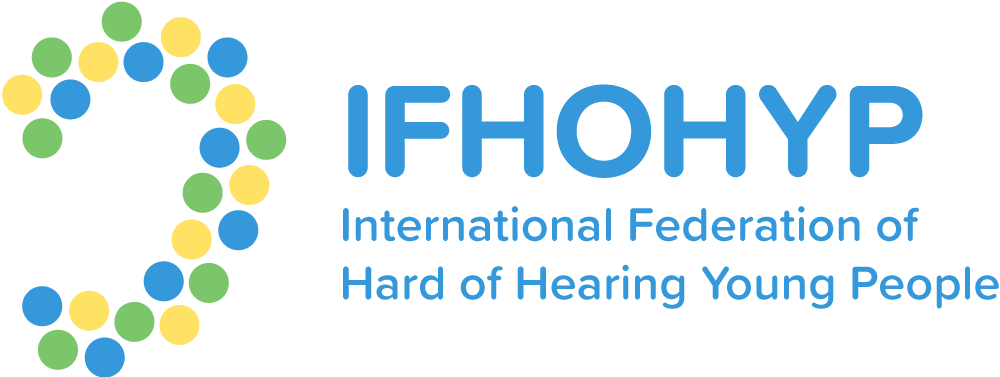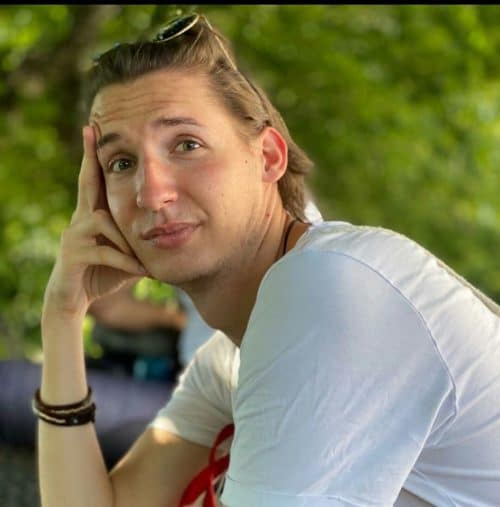MARIA: I’m trying to connect with Turin now – although it is not the sunny part of Italy that I once recall! I hope that one man, who I like so much, will find my signal in the ether! If anyone were to ask, I would describe you this way: Tomayo, the mix of tomato and mayonnaise (because of how much you love it), a man who always wears flip flops with socks and practically lives on a suitcase. He is never in one spot for long as he is always going somewhere, an absolute master of signing, the guide between two worlds. Did I miss anything? Perhaps I shall give you a looking glass and ask you, “what do you see in it?”
TOMASZ: That is all there is to it! I see someone who starts every day with pink glasses and a big banana smile on his face!
MARIA: Amazing! Please tell me, how it happened that you landed in Turin?
TOMASZ: At the beginning of last year my RAiDO organization (where I take an active part), got an offer from Pianezza Institut. They were seeking a volunteer for 6 months, from March to September. At this time, everything in my life had collapsed, my relationship, job, and acquaintances. I decided that it was a good a time to start fresh somewhere else. I filled out an application, and got a request for my CV. Which I, as a smelly slacker, tried to postpone it, because… I had it in Polish. And they wanted it in English Upon finally receiving it, the response was that I would be underutilized in this position due to my educational studies and experiences with Erasmus. Therefore, they extended an offer for 9 months in Turin instead (since September). But, in typical Italian fashion, it was delayed until November. Since this time, I have been camping out here. With a happy face!
MARIA: Speaking of going abroad… what was impulse for you to start to travel? Explicate to the uninitiated people, enlighten them, which kind of star camps out in Italy and shine in the society here 😀
TOMASZ: A mayonnaise star running around Italy in the flip flops – HAHA! Hmmm, may my brain cells start working… broom, broom, broom… so I was walking in the corridor at my university, around my third year of completing my Bachelor’s degree. One student asked me if I would like to go to an exchange to Germany, to realize a project about emotional pedagogy. As pedagogic studies are typically conquered mostly by women, in my department of social sciences there were only women – and it was much easier to notice a rooster parading in this department, hehe! Here’s how I came to know the words ‘Erasmus,’ ‘youth exchange’ and so on. Then I made a connection with the organization I represented; they sent me to various exchanges. I recall how on my second exchange I met my love - ahh, those butterflies in my belly…
It is participating in these projects that I got to know different options and people – with some I still have contact. It typically means me flying by plane to have a shot of Polish vodka and cook dumplings with them! Within this time, I also met others who are passionate about travel - so we combined our passions by purchasing tickets and discovering new places. Since then, from time to time I participate in workshops/youth exchanges/trainings and holidays abroad.
MARIA: What are you doing within your volunteering position in Turin?
TOMASZ: As you all already know, Erasmus gives us many opportunities (e.g. youth exchanges, training courses, workshops, and voluntary service). I always dreamt of going abroad for a longer period. There comes an offer to go to Italy for 9 months long in a voluntary capacity, called exactly European Solidarity Corps, ESC (former EVS-European Voluntary Service). I’m currently working at the Institute for the Deaf, where is a lot of activities to do with older people, as well as teenagers. All of them are Deaf. Therefore, everyone is signing-a honey, a pleasure for my ears! I help by supporting, watching, advising and educating them. Additionally, we have an Italian sign language course, because as we all know, EVERY COUNTRY HAS ITS OWN SIGN LANGUAGE. I’m really glad to be here. It feels if I can hear the same as if I wear hearing aid, but I don’t!
However, it was a bit difficult in the beginning because nobody here speaks English except for maybe 3-4 people I know. And nobody signs in a language other than Italian. But luckily, we have made a communication 😉 I have been here 8 months so far. Still alive and happy, if anyone asks Also, within ESC you can go for different projects, which is how I went to Albania for workshops, as a participant from Italy.
MARIA: How many countries have you been to so far? /evil smile appears in her face/
TOMASZ: Noooooo! Not this question, hahaha… Please give me some time to count it, haha!
1. Iceland, 2. Ireland, 3. England, 4. Portugal, 5. Spain, 6. France, 7. Norway, 8. Belgium, 9. The Netherlands, 10. Germany, 11. Austria, 12. Switzerland, 13. Italy, 14. Denmark, 15. Czech Republic, 16. Slovakia, 17. Hungary, 18. Romania, 19. Croatia, 20. Albania, 21. Ukraine, 22. Lithuania, 23. Latvia, 24. Turkey, 25. Georgia, 26. Armenia, 27. Vietnam, 28. United States, 29. Canada, 30. Mexico. Stop. Oh, I almost forgot… 31. San Marino. XD
MARIA: Weeell… How many times have you taken a plane?
TOMASZ: You overdid it !!! I won’t reply for that… haha! You have to give me at least 1 hour of silence, to be able to count that all… But I do know that during one year I managed to take around 50 flights. Shame on me. And I have been flying since 2015, so…
/a few days later, while poor Tomasz sits down, cried, and counted over and over…. what a cruel world, where interviewers torment poor interviewees/
TOMASZ: I counted to 96! But I don’t remember exactly… it’s weird, I don’t remember my returns. Hmm, does it have any explanation? Probably I’d need my laptop and access to internet to search for all my travel itineraries. Now I’m doing that in my head and while in transit to my 31st country on the list! 31st country on my list! Maybe it’s already my 100th flight?!
MARIA: So many travels have had to leave a mark and some incredible memories for sure! What is your craziest memory then?
TOMASZ: Damn, these questions are getting more and more difficult, don’t you have another set of questions for me? 😀 I will share what comes to mind first. October/November, weather much like winter: cold and windy. Recommended: to sit at home with books and put your biscuits in a warm tea. I decided to go on a youth exchange in Latvia. It was held in the forest, between trees and a pond. No shops in sight. The good news is, there was an indoor sauna and outdoor jacuzzi. On one particular evening after workshops, we went crazy! We decided to make our memories more memorable. Our idea was: 10 minutes of sauna, then running to the jacuzzi in our underwear. 5-10 minutes in jacuzzi. Back to sauna for another 5-10 minutes. And then… run around 50-80 meters to the pond! My mate had a close call with the ground in the meantime And eventually 5 guys from 3 different countries jumped into this pond. I have never heard so many swear words all at once, in so many different languages before – haha! And then we went to get out, but there was no ladder! It is a miracle that we somehow managed to crawl out of the pond and run to the jacuzzi, where we sat till dawn.
Next memory: January/February in Norway. You can just imagine how cold it is there and how much snow there was. So, another workshop was over, and we didn’t have any plans for the evening – yet. So, this time, with a Finnish girl, we decided we would go swimming. So, off came the pants, sweaters. T-shirts, and long underwear. Here we were running in the outdoors only to fall and be literally swimming in the snow. <3
I also remember how scared I was with a ‘pudding in my underpants,’ running around with my mate in Mexico, in the middle of night, looking for an ATM machine… and it is said that Mexico is famous for not so nice events…
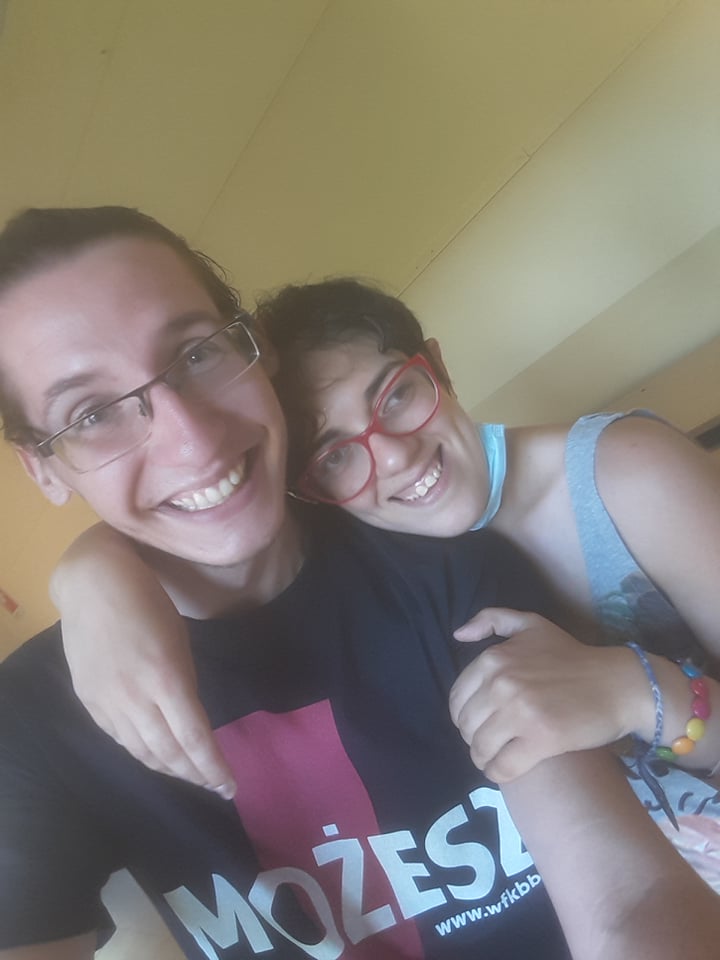
MARIA: Uh, oh, I’m glad that we still can enjoy you in one piece… maybe, to decrease the adrenaline a bit, let’s talk about the educational studies that you mentioned in the very beginning of this interview…
TOMASZ: Yeah, I have been studying educational studies for 3 years as part of a Bachelor’s degree, oligophrenic pedagogy to be specific. Further, I’ve been studying deaf education with educational therapy in Warsaw for 2 years within the Master’s degree program. Oligophrenic pedagogy is based on education and rehabilitation of intellectually disabled people. And deaf education – well you know what that is 😛 Shall I add that I was a raisin?
MARIA: A raisin?! Did you shrivel up from the Italian sun and from the grape became a raisin?
TOMASZ: Hahaha, yes! Well, I meant that I was the only guy in my studies. Until another guy joined in the second year of my bachelor’s degree.
MARIA: What ideas dawned on you to go for these studies?
TOMASZ: It’s partially because I wanted to study Deaf Studies. I like children. In large part because I was the guy to take care of the kids during wedding receptions or family gatherings. I have even been working as a babysitter during my summer holidays. Somehow, since a log time I had the idea to teach Deaf kids math, as I know that Math is Achilles’ heel for them. And I want to show them that Math doesn’t have to be scary, that 2 + 2 = 5. After a short review, I soon discovered that Deaf Studies was available only at the Master degree level, so I had to choose something else for my Bachelor. It is then that an offer came to go for oligophrenic pedagogy. In the beginning, the plan was to study in Gdańsk with my acquaintances, but it didn’t work out. Although they admitted me, the post office worked too slowly… So, here is my advice for future students: NEVER MAIL BY POST YOUR DOCUMENTS WHILE APPLYING FOR STUDIES! Do it in person, to be sure that they won’t get lost on the way!
MARIA: Oh gosh, how glad that I’m almost at the end of this crazy bureaucracy that occurred while studying…
TOMASZ: But I do miss my studies! Maybe one day I will come back to studying!
MARIA: Ach, these beautiful times of youth… Okay, circling back to oligophrenic pedagogy, was that a challenge for you, to make a connection between you and intellectually disabled people?
TOMASZ: I don’t recall if I ever escaped from them and called for help because a certain boy screamed. Or a girl banged her head on the table. Maybe this is because of my first cousin, who is also motor-impaired. Of course, in the beginning you start with familiarizing with each other and observations.
Later I have been working in ‘flat training,’ which means I visited their homes at the weekends. And I just am with them, as simply as that J To be ensured they didn’t put a knife into the mower or use a lavatory brush as a brush for dishes.
MARIA: A lavatory brush! And it’s a kind of rehabilitation? Are you with them to observe and to develop social skills or to serve as a care assistant?
TOMASZ: The latter. We aim to educate them on how to be independent. We are only advising them on what to do in different situations. In past tense, of course, I do not work there anymore, but my friend does!
MARIA: What were the results in your opinion? Did you notice progress in their independency?
TOMASZ: Unfortunately, it is difficult to say. Especially that it was during my first year of university, around 8 years ago. Jesus, what a shame to admit that, I’m old! 8 years ago!
MARIA: Oh, come on, antiquity is when your mind believes in that! But what is interesting is how you can become a care assistant?
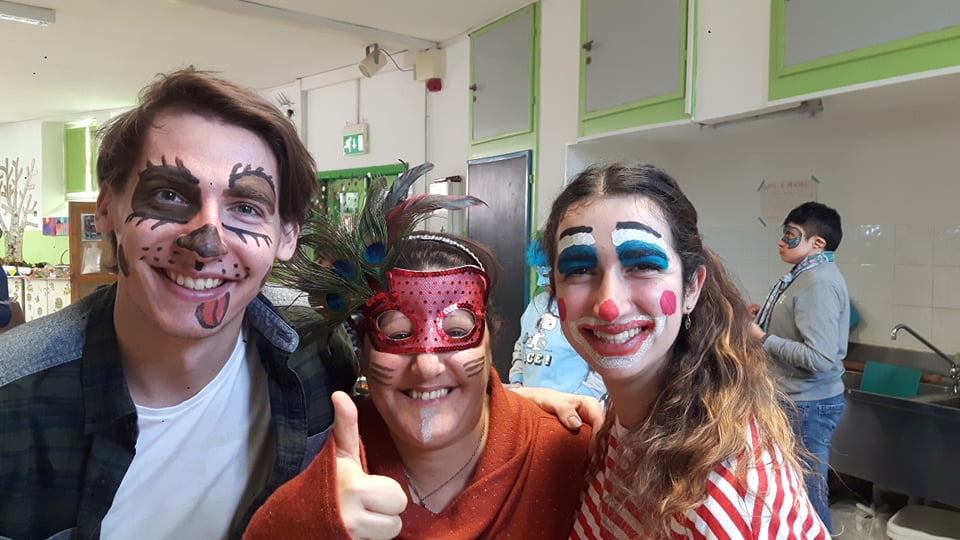
TOMASZ: It came from The Rehabilitative-Educative-Pedagogic Center. My professor responsible for my practices in these studies offered me that position as part of my Bachelor’s degree. I had to work for approximately 120 hours. I remember mornings when I rode with a driver to pick up the charges. On the last day of my voluntary period I entered the vehicle and informed him that it was my last day and that I would be back to my studies the following week. Typical small talk. Then I turned on the radio and a song played… ‘It’s the end, there is nothing beyond, we’re free, we’re free, we can go…’ We were in tears from so much laughter along with the driver - it was such a fitting song for my farewell!
MARIA: How did you become interested in Deaf Studies?
TOMASZ: I was born into a Deaf family, as both of my parents and sister were Deaf. So, we used sign language at home. And spoken language beyond. Days/weeks/months/years were passing by, my grandparents appeared when I was 7/8 years old and then the ‘World of Silence’ got lost at some point. But I had inside me this magnet for sign language . And practically the majority of my family works in this profession. The family of a teachers!
MARIA: If you were born into a Deaf family, how are you officially classified? CODA?
TOMASZ: I was born in ‘The World of Silence.’ My father was born hearing, but it progressively got worse when he was young and now, he has a honey in his ears 😉 Generally, after studying for 2 years and writing my thesis, I analyzed that there are so many classifications, like: CODA, KODA, SODA, GODA, OHCODA. Knowing myself and based on the quality of my memory, I likely skipped one (sorry!). In answering your question, I belong to OHCODA (Only Hearing Child of Deaf Adults), as the rest of my family has plugged ears and it is only me who clean my ears and therefore can hear something. XD Although, I could be classified as CODA, because most of people know only this definition.
MARIA: OH! CODA! I will remember it quite easily 😀 Which language was your first language?
TOMASZ: It’s the question that nurtures me since ever. I have never had the opportunity to talk about my childhood with my parents. Therefore there are gaps in my autobiography. But, theoretically speaking, if my family was Deaf then sign language came first. It is validated by the fact that I feel good and comfortable with sign language. But I also have been speaking as I only used sign language at home. Beyond the threshold of a home there was only a speech – mass school and so on. Hence after 26 years and looking at myself, my sign language and reaction when I am around ‘butterflies’ (deaf people), I think sign language was my first language.
MARIA: How did you learn to speak?
TOMASZ: Unfortunately, an answer won’t be complete, as I do not know my childhood. I do however remember a woman who had beautiful, loooong blonde hair. She came to my home and teach me how to speak (at least I think she was teaching me to speak). Also, two friends of my parents who were Deaf had hearing kids too. We were a big group: deaf parents+hearing kids.
MARIA: What happened that after a break you came back to sign language?
TOMASZ: Perhaps I will start from the beginning, how it happened that I had a break in signing, just to introduce readers and help them to catch the bug. So, as I mentioned before, I come from Deaf family. Unfortunately, one winter changed my life forever: I lost my family in a car accident. My dear Grandparents took care about me. As only my closest family used hands to communicate with them and the rest of my relatives use a tongue and larynx, I had to adapt to them. I have not used sign language for 12 years. It happened from time to time that I had an interaction involving sign language, but not too often. When it came to my studies, a certain woman messaged me on Facebook asking if I would like to be a sign language interpreter? Hahah. I found that very message, which she wrote to me on my birthday. Here is the context that paved the way to using sign language again: ‘I resume my request to you, I knew your father; I know that you know sign language and I’m looking for such people to collaborate with. It’s my phone number, best regards, Barbara P.’ It is thanks to this woman, who took me under her wing, that I developed my skills and I am here today, not somewhere else.
MARIA: Wasn’t one of your jobs to be a sign language interpreter?
TOMASZ: True, that is correct. My profession was, is and will be sign language interpreter. Regardless of which language. I think I am doing it automatically. I translate, no matter if I want to or not. It is not our fault that our ears are floppy and do not work like a Swiss watch. So, whenever I encounter someone who doesn’t hear, I automatically pull out my hands and translate. Even if this person is just deafened and doesn’t know sign language, I sign anyway… XD An example, my friends from Lublin! I remember how once someone told me: ‘Why are you waving your hands if I don’t understand anything?’ 😀 I’m currently interpreting all the time. As a matter of fact, I just started to challenge myself: I interpret from spoken English into Polish Sign Language. It’s not easy task. Not everyone pronounces English words as we would like them to. ‘Finally’ - ‘Fainalli’ rather than ‘finali’. As a result, I’m learning many forms of English, whether it is British, American, or even this mistaken version I’ve come to experience. I’m learning to be able to translate fully the context of a speech. I’m proud of myself that I have experienced two exchanges where I translated from spoken English into Polish Sign Language. Self-five!
MARIA: Is translating a challenge for you, to provide right content? As in our daily speech we have so many metaphorical phrases.
TOMASZ: When there occurs phrases/sentences that oblige to use abstract, I’m trying to present you something like a moral, a thing that is the most important. An example, in Polish we have a proverb ‘If a goat hadn’t jumped, it wouldn’t have broken a leg’. So, I translate that it’s necessary to be careful, if you weren’t crazy you wouldn’t have broken a leg – of course referring to the context used by a person. It’s impossible to prepare ready text in sign language to sign. It’s true, you can get materials, written sources and interpret it by yourself, sign it. But it’s much more difficult the opposite way: when someone uses sign language. It becomes a problem because sign language grammar contains simple sentences and people usually speak using complex sentences. In translating, we cannot say it as someone signed, we must adapt a structure of sentence and carefully pick the words.
It’s not easy, but as people say: humans keep learning their whole lives. And journeys develop the human. The world belongs to brave ones. And we shall live every day as much as we can, because we even don’t know when the sun will bow out and won’t rise.
With these words we encourage you to carpe diem and try to enjoy being present, like Tomasz does whilst running around Italy in his flip flops, pink glasses and charming banana smile, no matter the adversities you face in your life.
